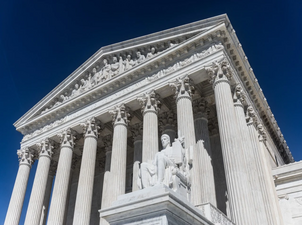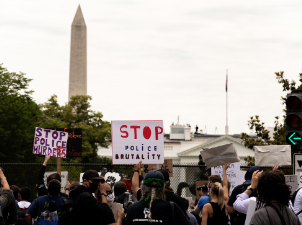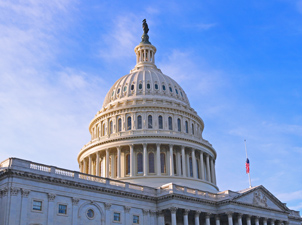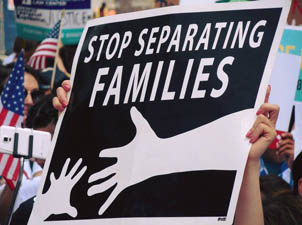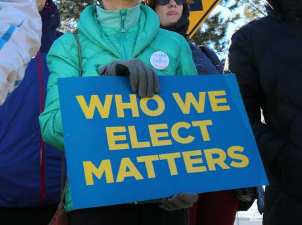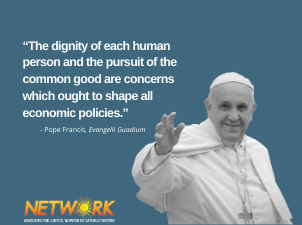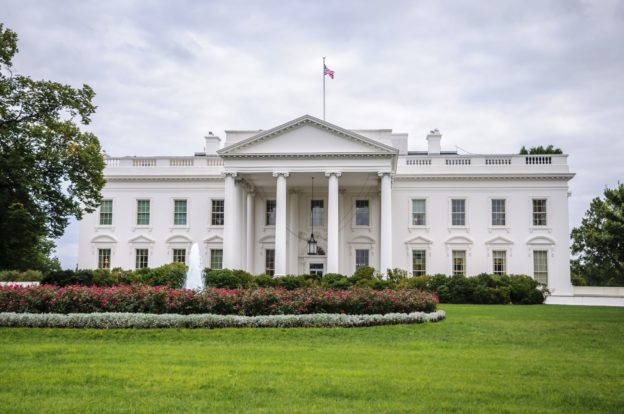
The American Rescue Plan Meets the Moment
Caraline Feairheller
March 16, 2021
On March 11th, President Biden signed the American Rescue Plan into law. This historic and widely popular $1.9 trillion COVID-19 relief package is both an investment in our communities’ future and provides immediate relief to struggling families.
Across the country, people navigating these unprecedented health and economic crises know what is needed for their families and communities to thrive. This new law includes funding for vaccine distribution, cuts child poverty in half, and protects essential workers. The American Rescue Plan will help our vulnerable communities survive this deadly pandemic, and all the NETWORK members and advocates who helped pass it should be proud.
NETWORK has consistently called on Congress to uphold their moral responsibility to quickly deliver a robust COVID-19 relief package that prevents more needless suffering. While there is still more work to do, NETWORK celebrates the final relief package, which includes:
Relief Payments: $1,400 emergency payments.
What we lobbied for: Automatic cash rebates, regardless of immigration status, age, or tax filing.
People need money to pay rent and mortgages, utility bills, grocery bills, and so much more. The automatic and immediate cash relief payments included in previous COVID-19 relief packages and in the American Rescue Plan will help individuals and households weather job losses and economic disruption. Specifically, the American Rescue Plan:
- Provides $1,400 emergency payments to single filers with incomes up to $75,000, head of household filers with incomes up to $112,500, and joint filers with incomes up to $150,000.
The American Rescue Plan makes relief checks available to citizens and family members with Social Security Numbers in mixed status families, giving 3 million people and 2.2 million children access to aid. Unfortunately, undocumented immigrants who are also experiencing the same negative health and economic effects of this pandemic still do not receive a stimulus check under the American Rescue Plan.
Tax Justice: Increases the Child Tax Credit, allows parents to receive it monthly, and raises low-income workers’ maximum Earned Income Tax Credit.
What we lobbied for: Permanently expand the Earned Income Tax Credit (EITC) and a robust Child Tax Credit to reduce children poverty
The pandemic has resulted in many families with young children struggling to keep a roof over their head and food on the table. Alternatively, more than 5 million childless workers are taxed into, or deeper into, poverty. The expanded Child Tax Credit and EITC benefits will cut childhood poverty in half and help mend the racial wealth and income gaps. Specifically, the American Rescue Plan:
- Increases the current $2,000 per child to $3,000 per child and to $3,600 for children under age 6.
- Makes the Child Tax Credit fully refundable which ensures that 27 million children currently left out are able to receive the full benefits.
- Allows parents to receive regular monthly checks beginning on July 1, 2021 so families have access to assistance throughout the year.
- Raises the maximum Earned Income Tax Credit for adults without children from $530 to nearly $1,500 and raises the income limit for the credit from $16,000 to about $21,000, resulting in additional income support to over 17 million working childless adults.
The increased Earned Income Tax Credit and the increased, and monthly, Child Tax Credit are only approved for one year. Further legislation is needed to make these poverty-reducing policies permanent.
Food Security: Increases and extends Supplemental Nutrition Assistance Program (SNAP) benefits, funds the Women, Infants, and Children (WIC) Program , and extends Pandemic Electronic Benefit Transfer (P-EBT) to include both the school year and summer.
What we lobbied for: Extend 15% boost in SNAP benefits by, Eliminate SNAP eligibility barriers for immigrants, and expand school lunch programs in order to provide meals when school is not in session.
The pandemic and accompanying economic downturn have led to a rising hunger crisis. The American Rescue Plan combats this rising insecurity through critical investments in SNAP, WIC, and Pandemic-EBT programs. Specifically, the American Rescue Plan:
- Extends the 15% boost in monthly Supplemental Nutritional Assistance Program (SNAP) benefits to September 2021.
- Allocates $880 million in funding for the Special Supplemental Nutrition Program for Women, Infants, and Children (WIC). This funding will support WIC outreach, innovation, and program modernization.
- Invest $5 billion in Pandemic Electronic Benefit Transfer (P-EBT) so families have access to school meals during the school year and summer months.
The American Rescue Plan makes aid available to children who would have received free or reduced-price meals at a school that is closed are eligible for P-EBT, regardless of immigration status. WIC, The Emergency Food Assistance Program (TEFAP), and home delivered meals are also available to immigrant families. SNAP is only available for certain non-citizens such as asylees, refugees, and some green card holders. Parents who are not eligible for SNAP can apply for their eligible household members.
Minimum Wage: Federal minimum wage remains at $7.25.
What we lobbied for: Raise the federal minimum wage to $15 by 2025.
NETWORK denounces the fact that the American Rescue Plan failed to raise the minimum wage to $15 an hour. It is well past time to raise the wage and is shameful that low-income workers have gone over a decade without a raise from the federal minimum wage of $7.25. A raise in the wage would take significant steps in addressing income inequality and would lift the pay of nearly 32 million workers. Congress must find a way to take meaningful action to care for our struggling families and uphold the dignity of workers by raising wages.
Housing Assistance: Provides billions of dollars towards emergency rental assistance and other housing-related costs.
What we lobbied for: Extend the federal eviction moratorium and invest $5 billion in emergency rental and utility assistance, as well as $28 billion in funding for housing vouchers.
A growing number of people are staying at home across the nation, without work, and reliant on emergency paychecks designed to stimulate economic growth and pay for last month’s rent. The pandemic has resulted in nearly 1 in 5 renters not being caught on up on rent and with renters of color disproportionately expiring this hardship. Continual investment in housing assistance with help struggling families have a safe place to live as the pandemic continues. Specifically, the American Rescue Plan:
- Provides $22.5 billion to state and local governments to help low-income households cover back rent, rent assistance, and utility bills.
- Provides $10 billion for the Homeowner Assistance Fund, which allocates funds to struggling homeowners directly or indirectly impacted by the COVID-19 pandemic.
- Provides $5 billion for emergency housing vouchers to transition individuals and families who are at risk or are currently experiencing homelessness.
However, the American Rescue Plan does not include a specific provision to extend the national eviction moratorium — which is set to expire March 31, 2021.
Unemployment Benefits: Raises unemployment payments by $300 a week and extends them through September 6, 2021.
What we lobbied for: Extended and expanded unemployment benefits until at least September 2021.
As the COVID-19 pandemic enters into another year, many individuals and families have used the last of their savings. The nation’s Unemployment Insurance (UI) program is one of the primary infrastructures needed to provide financial help and its extension will prevent workers and families from experiencing total financial devastation. Specifically, The American Rescue Plan:
- Extends the Federal Pandemic Unemployment Compensation (FPUC) through September 6 at $300 in benefits per week.
- Exempts up to $10,200 in unemployment benefits received in 2020 from federal income taxes for households making less than $150,000.
- Extends Pandemic Unemployment Assistance (PUA) and Pandemic Emergency Unemployment Compensation (PEUC) through September 6.
The American Rescue Plan is a broad and historic piece of anti-poverty legislation. President Biden and his administration have passed legislation that centers families experiencing poverty and communities of color, who have been disproportionately impacted by the COVID-19 pandemic. While the legislation is far-reaching and this summary only captures our top priorities, NETWORK Lobby is proud to have lobbied on a bill that will allow us to begin the work of Building Anew.







